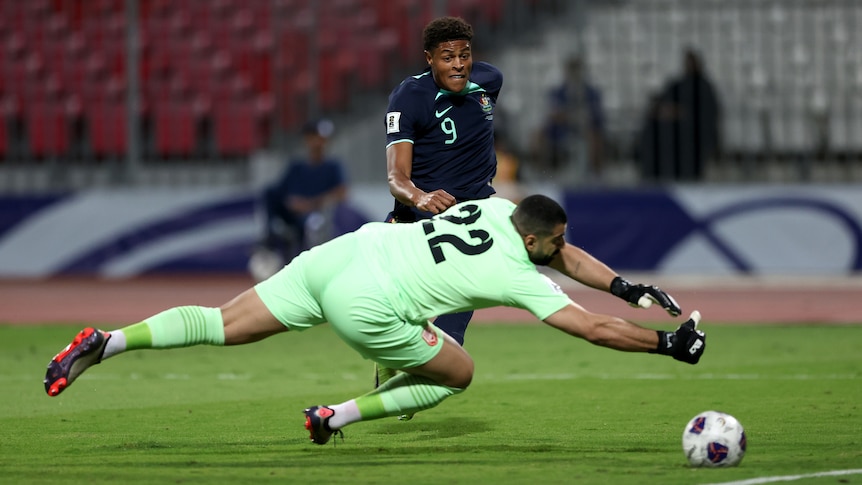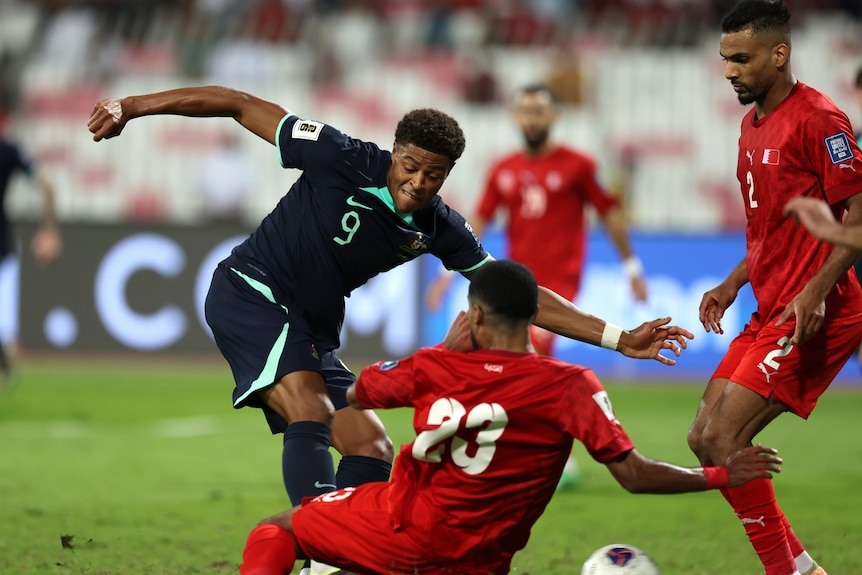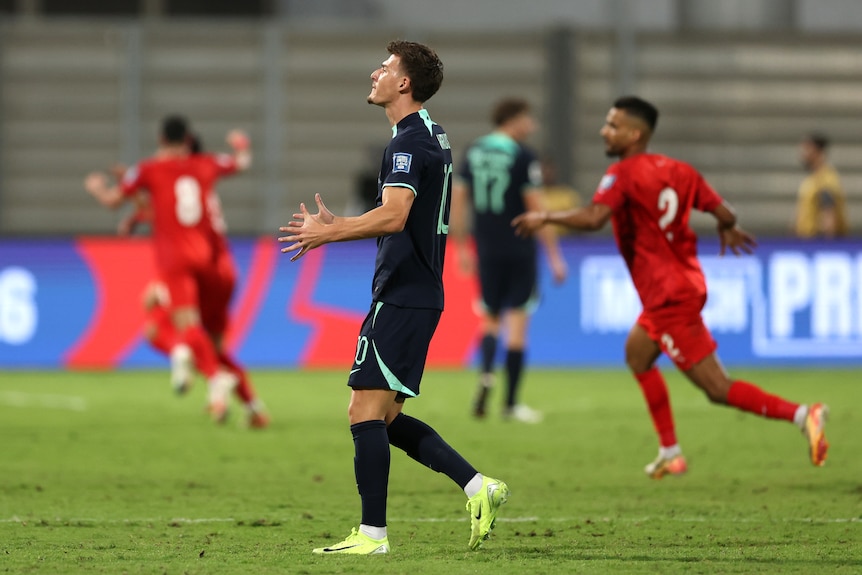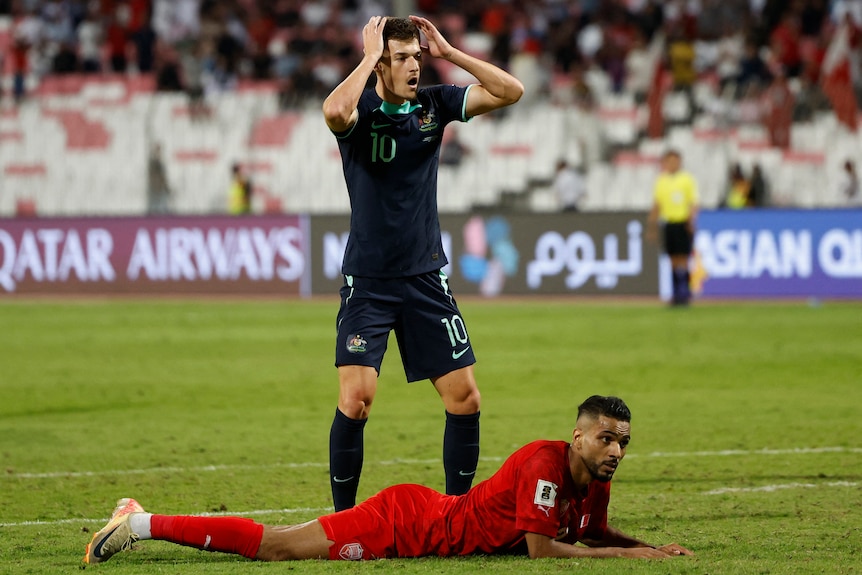Sports
Author: anonymDate: 2024-11-21 12:23:24
Australia's national football team struggles with persistent scoring issues following a disappointing World Cup qualifying series.
Where can the Socceroos find more goals from?
The Australian team had a prime opportunity to solidify their position in the World Cup qualifying group during the November matches. This chance was squandered. This missed opportunity encapsulates their performance, characterized by a succession of thwarted scoring attempts. They will likely regret these missed chances. Twice this week the Australians failed to gain separation from the group of nations pursuing Japan—who appear poised to top the standings. After six games, Australia sits second, one point ahead of the other four teams tied on six points. This congestion appears insurmountable, with Saudi Arabia's unexpected loss to Indonesia adding a twist; every team has at least one victory in Group C. "Maintaining consistent results is proving difficult for everyone," remarked Tony Popovic after the 2-2 draw versus Bahrain.

That's inaccurate—the Australian team has drawn three consecutive matches against Japan, Saudi Arabia, and Bahrain. This grants Popovic an undefeated start as national team coach, although with only one victory in four games—the initial boost of a new coach waning. Each of these three outcomes could have easily swung the other way.
Share analysis Australia's national football team struggles with persistent scoring issues following a disappointing World Cup qualifying series Simon Smale By Simon Smale Topic:Socceroos Wed 20 Nov Wednesday 20 November Socceroos players walk slowly with their heads down Where can the Socceroos find more goals from? (Getty Images: Christopher Pike) Link copied Share article The Australian team had a prime opportunity to solidify their position in the World Cup qualifying group during the November matches. This chance was squandered. This missed opportunity encapsulates their performance, characterized by a succession of thwarted scoring attempts. They will likely regret these missed chances. Twice this week the Australians failed to gain separation from the group of nations pursuing Japan—who appear poised to top the standings. After six games, Australia sits second, one point ahead of the other four teams tied on six points. This congestion appears insurmountable, with Saudi Arabia's unexpected loss to Indonesia adding a twist; every team has at least one victory in Group C. "Maintaining consistent results is proving difficult for everyone," remarked Tony Popovic after the 2-2 draw versus Bahrain in Riffa. Bahrain draw 2-2 against Socceroos Photo shows Kusini Yengi scoresKusini Yengi scores The Socceroos rescued a point late against Bahrain at the National Stadium in Riffa, having been stunned with two quick goals in the second half. That's inaccurate—the Australian team has drawn three consecutive matches against Japan, Saudi Arabia, and Bahrain. This grants Popovic an undefeated start as national team coach, although with only one victory in four games—the initial boost of a new coach waning. Each of these three outcomes could have easily swung the other way. The narrow margins in international football are undeniable. Had the highly contested—but accurate—offside call against Saudi Arabia not been made, Australia would have lost in Melbourne. A late goal by Kusini Yengi rescued a draw against Bahrain on Tuesday, narrowly avoiding an utter defeat. This situation should never have arisen for Australia in Riffa.

Yengi had several scoring chances after his opening goal in the 38th second. The 25-year-old, despite six goals for the national team, isn't a prolific scorer, having yet to score for Portsmouth this year (398 minutes played). He could have easily scored three goals before Bahrain's first goal. In the first half, Ebrahim Lutfalla made a quick save; in the second, a chest shot struck the post. But he missed a clear chance shortly afterward, a poor first touch preventing a shot. A significant blunder. Fifteen minutes later, Bahrain took the lead. Mahdi Abduljabbar's accurate shots exposed Australia's poor finishing—a long-range goal and a poacher's goal within a minute highlighted Australia's lack of decisiveness.

In six qualifying matches, the Australian team scored six goals, failing to score in three games. From 70 attempts, only 19 were on target (27% accuracy)—a figure that understates the missed opportunities. Japan, in comparison, had 73 shots (36 on target, 49%) and scored 22 goals. Interesting, but not entirely condemning. Saudi Arabia scored only three goals from 81 shots (17 on target, 20%), while Bahrain (27%) and China (25%) have similar shooting percentages, albeit with fewer attempts. Only Indonesia, with 45% accuracy from 53 shots (six goals from 24 on target attempts) and a win and three draws, compares to Japan. The Australian team managed only six shots on target in their last three games, the lowest in the group. Their 22 attempts in that period are fewer than Saudi Arabia's shots in its last game alone—a fact that did not benefit Saudi Arabia. That's all well and good, but how does one find a reliable goal scorer to capitalize on the many scoring chances created?

In reality, options are limited. Nestory Irankunda was omitted after inconsistent national team performances, despite his talent. Irankunda primarily plays for Bayern Munich's reserve team in the German fourth tier (four goals, three assists in twelve games), and recently scored in the UEFA Youth League. He requires time to adjust before carrying the weight of expectations for the Australian team. Brandon Borrello, with two goals and two assists in the A-League, made a brief, ineffective appearance against Bahrain. Martin Boyle, an unused substitute, is performing well for Hibernian (five goals, five assists in fifteen games). Popovic makes changes readily, replacing Joe Gauci with Maty Ryan in goal—a decision whose impact is unclear, with Ryan's performance influenced by deflections.
Popovic will undoubtedly be actively searching for goalscorers domestically and internationally, encouraging A-League players like Western Sydney Wanderers' Nicolas Milanovic to maintain their goalscoring form. Defensively, the Australian team is solid—five goals conceded is second-best, behind Japan's two.
Harry Souttar's aerial prowess was a crucial asset, a largely untapped scoring threat from set pieces, supported by Cam Burgess and Hayden Matthews—Matthews' header hitting the post for Bahrain's second goal. However, Burgess should have reacted better to Abduljabbar's first goal. A break now follows, before four matches—Indonesia (late March), China (away), Japan (home), and Saudi Arabia (away)—a challenging end to the qualifying phase. The Australian team hopes to have improved their standing by then, avoiding a crucial match against Saudi Arabia in hostile territory. However, any more mistakes cannot be afforded.